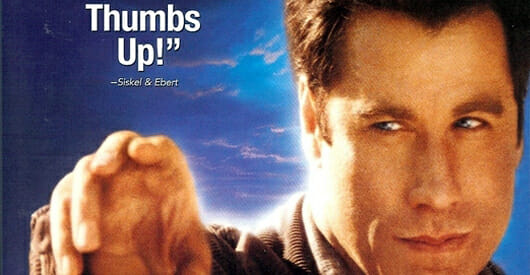
Did you ever see the 1996 movie Phenomenon? It starred John Travolta as small-town car mechanic George Malley. Here’s the IMDB.com summary:
The main character observes a strange light on his birthday at a bar. The following days he becomes very intelligent and puts the intelligence to good use in his community. When word gets around he becomes known as a freak and everyone wants to figure out why this happened to a car mechanic. The government also wants to get their hands on it to put it to other uses.
Yeah, the government bit at the end wasn’t very convincing in the picture either. It looked like something tacked on in a script meeting to add “excitement” to an odd and, in the end, somewhat depressing story.
It turns out the strange light returns, and it’s eventually revealed through the kindly Doc Brunder (Robert Duvall) that George has a brain tumor. Of course George still feels like he’s been touched by a higher power anyway, because he’s in the throes of a force greater than himself, a restless curiosity and problem-solving zeal that leads to significant breakthroughs.
It’s obviously contrived in many ways. This was part of the great Travolta “comeback.” Part of the pathos is supplied by George’s love interest, Lace Pennimin, played by Kyra Sedgwick. Even Forrest Whitaker shows up as George’s aw shucks friend Nate Pope. At one point, the new superbrainy George says to Nate, “Now Nate, everything that we need is already in us, we just got to clear away the crap that it’s buried under.”
But the movie is based on true stories, and there’s little reason to doubt them. No matter what you think of Travolta’s acting ability, he is able to portray a rather slow fellow waking up to a world he had never even dreamed of before. George becomes superconscious for a while, able to turn his huge brainpower to the most esoteric tasks. He blazes through technical and reference books correcting them as he goes.
Scientists say we only use about 10% of our brain power. Not being a brain scientist, it’s always mystified me how they come up with these percentages. Are they sure it’s not 20%? Or 5%? Really?
A few years ago a close friend of ours started to experience spontaneous hallucinations that were actually embodied “apparitions” that appeared during her waking life. Initially frightened, she eventually started researching the phenomenon and found a surprising amount of testimony to the same kind of thing that happened to her. Eventually they faded away, but they were quite real while they were there.
I bet you know stories like these too. We sense there’s a huge and hidden force beneath the ordinary intelligence that we experience every day. Hey, it takes a lot of intelligence to maneuver through day to day life, to drive a car, write an expense report, book a vacation in Fiji.
But then there are these flashes of something else, something far more vast, oceanic, unified, interconnected, amoral, intuitive, primitive, wild, intense, perceptive. Something that is capable of moving us profoundly even while our conscious mind sputters in protest.
For a lot of us, writing is where we come in contact with that other, the “dark side” of our own moon, the place we can’t see directly. The ideas that fill our notebooks, that come pouring out of us and through these millions of keyboards, where do they come from? Do you “make them up” like some teacher planning a school play? You know you don’t.
What we do, it seems to me, is open ourselves as a vessel. Get the hell out of the way. We shift away from the jabbering monkey inside our mind long enough for something else to appear. It appears as it appears, in dribs and drabs, in spurts and stops.
Or like Rainer Rilke, locked in Duino Castle, a lightning bolt going through him so fiercely he created some of the most astonishing poetry of the twentieth century in a few short weeks. Here’s the opening of the first Duino Elegy:
Who, if I cried out, would hear me among the Angelic
Orders? And even if one were to suddenly
take me to its heart, I would vanish into its
stronger existence. For beauty is nothing but
the beginning of terror, that we are still able to bear,
and we revere it so, because it calmly disdains
to destroy us. Every Angel is terror.
Almost like something George Malley might have done, after he saw that flash of light. What will it take to drop us, full and busy, into that stream of creativity surging just below our awareness?


